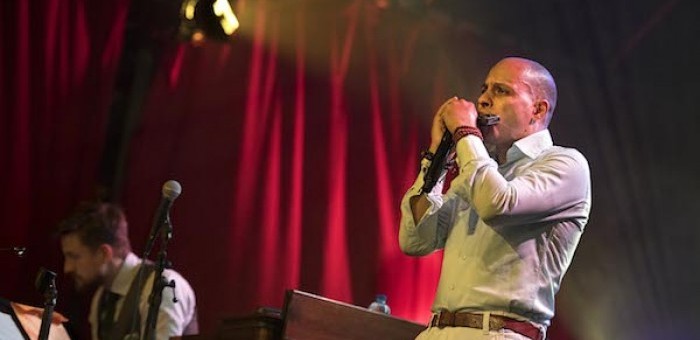Jan 13, 2026 2:09 PM
More Trump-Kennedy Center Cancellations
The fallout from the renaming of the John F. Kennedy Center for the Performing Arts to include President Donald…

Ondrej Pivec (left) and Grégoire Maret perform at the North Sea Jazz Festival in Rotterdam, The Netherlands, on July 10.
(Photo: Steven Sussman)Even though he’s still riding the crest of his latest recording, Wanted (Sunnyside), harmonica virtuoso Grégoire Maret arrived at the North Sea Jazz Festival in Rotterdam, The Netherlands, on July 10 with a very different repertoire, using the stage to share with the audience a brand new project called “The Gospel According to Grégoire Maret.”
The set at the open-tented Congo venue was electrifying, soulful, smooth and spiritual as Maret led his groove-oriented nine-piece ensemble (with a heavy emphasis on vocals) with an ecstatic delivery. A sonic shape-shifter, he used his harmonica to warp through a range of sounds, recalling at times a dark tenor saxophone, at others a high-pitched oboe.
The chromatic harmonica maestro opened a new orchestral world of colors, rhythms and harmonies at his packed North Sea show, which opened with the appropriately titled “Groove.” He arched his body into rhythmic blowing, bending low then rising up as drummer Marcus Baylor pushed the music ahead. It was a fiery opening that drew more people in to check out the source of the onstage excitement. And it was a new style of worship, too, with vocal choir, churchy organ and big beats that would rock any Stateside church with ease.
While he originally made his name as a sideman—alongside such giants as Herbie Hancock and Pat Metheny—Maret has been building an impressive resume as a leader, especially with his new gospel project, a joint endeavor set into motion with keyboardist Shedrick Mitchell and Baylor (both of whom attended The New School with Maret back in the day); Baylor’s wife, vocalist Jean Baylor; and arranger/vocalist Stephanie Fisher.
The ensemble, which is about a year-and-a-half old, figures prominently into Maret’s plan for a recorded trilogy that includes Wanted and a collection of songs exploring the prison system, which he says “makes for a form of slavery, especially for black people.”
The new gospel project abounds with a sense of freedom, which Maret said he wanted to manifest now, given the state of chaos in the political arena. He noted in a Talking Jazz session after the show, “Historically when black folks become oppressed, one of the only means to break the chains and feel free is through the music—and gospel in particular.”
While the bulk of his music is instrumental, for the gospel project Maret said he wanted to write songs with strong melodies and chord changes, which he spent months perfecting. But when it came to lyrics, he begged off. “It’s something I just can’t do,” he said. “So that’s where Jean and Stephanie came in. And Stephanie is a choir master at her church, so she put together the arrangements.”
Maret’s rendition of gospel steers clear of preaching and evangelizing, but is instead gospel-esque; it emphasizes organ and choir, with tempo accelerations and harmonica lines weaving together with the vocal harmonies. (With the exception of Fisher, singers were enlisted from Britain, including Kersha Bailey, Monique Meade and Raffaele Crolla.) Mitchell, a church organist, missed the gig but was replaced by one of his protégés, Ondrej Pivec, who pumped juicy phrases on the Hammond B-3.
While another Brit, Zara McFarlane, was featured as a guest singer, her performance was overshadowed by Crolla, a late addition whom Maret had met only two days before the show. On “Lullaby,” a concert highlight, Crolla sang with r&b gusto while Maret played off of him with a powerful lyricism.
Another highlight came at the end of the performance, with the song “Free,” an old Maret instrumental that had been shelved but came to new life with Jean Baylor’s lyrics. The tune starts in a floaty zone before a speedy beat kicks in, spurred by Maret’s bent notes. Marcus Baylor charged in at high volume, and he and the leader engaged in a crashing, tumbling and driving dialog that served as the tune’s—and the show’s—climax.
“The Gospel According to Grégoire Maret” was originally fine-tuned in small clubs around New York, then played to a big crowd at this year’s Winter Jazzfest in New York, where bookers began signing them up for shows. Maret will revisit the program in September at the Detroit Jazz Festival.

Belá Fleck during an interview with Fredrika Whitfield on CNN.
Jan 13, 2026 2:09 PM
The fallout from the renaming of the John F. Kennedy Center for the Performing Arts to include President Donald…

Peplowski first came to prominence in legacy swing bands, including the final iteration of the Benny Goodman Orchestra, before beginning a solo career in the late 1980s.
Feb 3, 2026 12:10 AM
Ken Peplowski, a clarinetist and tenor saxophonist who straddled the worlds of traditional and modern jazz, died Feb. 2…

The success of Oregon’s first album, 1971’s Music Of Another Present Era, allowed Towner to establish a solo career.
Jan 19, 2026 5:02 PM
Ralph Towner, a guitarist and composer who blended multiple genres, including jazz — and throughout them all remained…

Rico’s Anti-Microbial Instrument Swab
Jan 19, 2026 2:48 PM
With this year’s NAMM Show right around the corner, we can look forward to plenty of new and innovative instruments…

Richie Beirach was particularly renowned for his approach to chromatic harmony, which he used to improvise reharmonizations of originals and standards.
Jan 27, 2026 11:19 AM
Richie Beirach, a pianist and composer who channeled a knowledge of modern classical music into his jazz practice,…